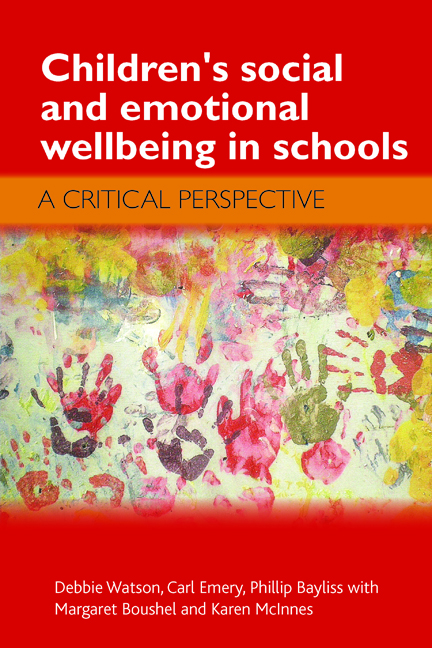Chapter 13 - Policy and practice reflections
Published online by Cambridge University Press: 01 September 2022
Summary
Introduction
The policy and practice chapters raised issues that deserve further attention. We start with the policy that, more than any other, has driven wellbeing practice in UK schools, Every Child Matters (ECM) (DFES, 2004a). ECM uses an objective list model of wellbeing, with Social and Emotional Aspects of Learning (SEAL) and many of the conflict resolution programmes serving as its operationalised arm. ECM, ‘warts and all’, is the vehicle through which notions of wellbeing are currently addressed in school settings. It sets out a centralised and prescriptive framework within which childhood is viewed. There is, particularly in English schools, a lack of evidence, evaluation or critical debate regarding the actualisation of ECM through Social and Emotional Learning (SEL) activity. While engaging with children's social and emotional development is vital, and the contested nature of the concept of wellbeing in education does not mean that there is not a need for many of the activities taking place on the ground, there remain concerns with the implementation of ECM that derive from the philosophy behind it.
The philosophy of Every Child Matters
ECM takes a clear egalitarian philosophical position, every child matters as much as the next. This has translated, within SEL, into the universal application of a deficit model of wellbeing to all children, arguably one of the key failures of the scheme. ECM currently covers whole schools, monitoring and measuring the social and emotional development of all pupils. An alternative framework might start from acknowledging the positives many children already have in this field, and offering greater support to children with greater needs, arising from dialogue built upon being known (see Chapters 11 and 12). True dialogue can only arise within relationships that acknowledge the local context and culture of each child (and adult). Every child matters, but no two children matter in precisely the same way.
The status of ECM as state-sanctioned suggests that the state is interested in fixing the deficits it perceives many children to have. ECM implies that we need to be protected from our children, that our children need to be protected from themselves and that all of us need to be protected from poor parenting practices. As Clements and Clements (2000) noted: ‘the notion that children are now subject to innumerable risks in greater numbers, and with greater consequence than ever before can only have a corrosive effect on child-rearing’.
- Type
- Chapter
- Information
- Children's Social and Emotional Wellbeing in SchoolsA Critical Perspective, pp. 209 - 220Publisher: Bristol University PressPrint publication year: 2012



